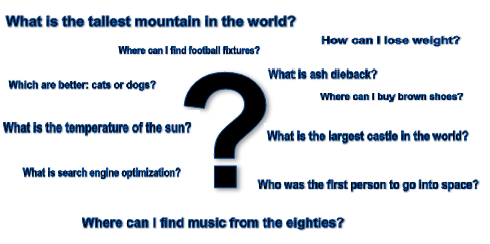“Good questions outrank easy answers” – Paul Samuelson
This is not an article on philosophy although the title may have you questioning what sort of relevance this has to search marketing. Fear not though, as there is some method in the madness behind the point of the title.
Human Nature: A Thirst for Knowledge
Curiosity is ‘ingrained’ in the human psyche. We have a thirst for knowledge and an innate desire to ask questions and seek answers. At the most basic level these questions are for a practical purpose: where is the local shop? When will this bus arrive? What are the bank holiday days this year?

Other questions are deeper or more difficult to answer: are we alone in the universe? What is the purpose of life? Are there other universes out there? Our determination to not only ask these questions, but also challenge ourselves to find our answers is what makes us unique.
Even the most brilliant of scientific minds cannot answer all the questions relating to our existence but a simple Google search will lead you to many speculative theories – as wild and varied as they may be!
The Internet Highway and Panda Power
The power of the internet highway has allowed human beings to build the most gigantic encyclopedia of information and knowledge, which can be accessed by anyone at a click of a button. The middle men, acting as the gateway/gatekeepers of this vast archive of knowledge are the search engines – Google, Bing, Yahoo, Baidu etc.

The flaw in this is that not every search result will be beneficial and not every question is so finely tuned that it provides a list of results that lead directly to the answer the searcher was looking for. In fact, in some instances, it can be as many as two or three pages before a result may be relevant. That is where search marketing comes in.
The job description of someone involved in search marketing is constantly evolving and it is vital for us to keep up with the industry and the changing digital landscape around us, as search plays a more important role in our lives in the 21st century. Googles Panda and Penguin updates showed us that the search giant is determined to eradicate poor quality content from organic search results. The focus, therefore, for search engine optimisation experts and people in content marketing should always be on creating content that is:
- High in quality and relevance
- Interesting and engaging
- Authoritative and relevant
- New, controversial, shocking, useful, amusing or any combination of these things
If you are not doing this, the warning bells should be ringing, if they have not been already for some time!
Creating Content and the Power of the Question
The difficulty in content creation is that you have to find some form of hook; some linkable factor that makes the content you provide outshine others. Anything that is funny, interesting or engages the readers is likely to be shared or linked to. How does this relate back to the opening points and the questions asked by people searching?
Most webmasters will see that people visit their site through the use of long-tailed keywords such as those questions asked at the opening. Set yourself apart from the rest by not just answering the question but pose further questions in your content or even question yourself.
If you can add in an element of debate into your content, it is much more likely to be shared or linked to, as people form their own opinions or look to counter your points. But be careful, as asking too many questions, or opening a post with a deliberately contentious question, could devalue any content or make it look unattractive to Google, potentially risking losing readers and not helping your rankings.
Inquisitive = Good
The simple conclusion in all of this is that being inquisitive keeps us in our jobs. If people did not have that inquisitive nature to look for answers, there would be no purpose in a search engine. But Google has shown us that if the content is good enough and ticks the right boxes in its algorithm, then it will rank well and your authority, including author rank and domain authority, will grow significantly. Higher rankings lead to increased chance of conversions (in business) or new people following your website. Who knew that just one question could hold so much power?


